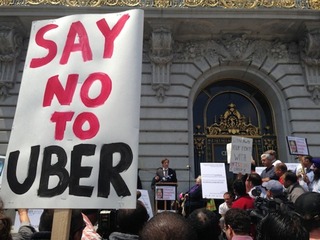
#Ubergeddon results in surge in Uber app downloads
As cab drivers jammed up the streets of London to protest Uber, commuters turned to...Uber

Ubergeddon is upon us, and lo, there was a great wailing and gnashing of teeth.
Thousands of cab drivers have taken to the streets of several cities across Europe, including London, Paris, Berlin, Madrid, Milan, and Lisbon, to protest Uber’s European expansion. Some 12,000 black cab drivers organized a traffic jam in Trafalgar Square, Whitehall, and Parliament Square that law enforcement warned would get them arrested.
Morning and evening commutes across Europe were bogged down with the outpouring of thousands of cabs who are protesting not just Uber, but all ride-sharing apps that allow non-professional drivers to skirt the regulations that govern cab drivers. By avoiding local insurance rules, cab drivers say that Uber drivers and other app-based driving services (like Hailo and Kabbee) are in violation of licensing and safety regulations.
And they’re totally right. But maybe—MAYBE—f*cking over everyone else’s morning commute isn’t the best way to deal with this issue.
Indeed, Uber’s UK and Ireland general manager Jo Bertram said that app downloads in the region were up a whopping 850% due to the protests.
The economic impact from the London protests is estimated to teeter around £125 million.
Bertram noted that Uber has submitted to Transport for London’s (London’s transportation regulatory body) audit of a Private Hire Vehicle operator and passed with “flying colors.”
To play devil’s advocate for a minute, there is something to be said for the need for tight regulation of anything that could put the public at risk. Currently in London, there are an estimated 1,125 sexual assaults against women by cab drivers every year. Earlier this year, London black cab driver John Worboys was arrested and given life in prison after it was determined that he drugged and raped upwards of 100 women who he picked up on his routes (he would pretend to have a big casino or lottery win and would ask his customers to celebrate with him with a glass of spiked champagne).
Uber—like other car-sharing services and, of course, the regulated taxi industry—has had quite a few complaints about creepy, stalky, and even abusive drivers. Unlike taxis, however, Uber’s hiring process is much less rigorous. When offering free rides to SXSW attendees in 2013, Uber hired 50 new drivers off of Craigslist, performed a background check, and gave them a 45 minute orientation—20 minutes of which was devoted to filling out forms.
To drive a taxi in New York City, a driver is fingerprinted and given a background check, drug tested, and put through a defensive driving course as well as a sex trafficking awareness course.
Founded in 2010, Uber now operates in 128 cities across 37 countries. The company recently announced that it has raised one of the largest rounds in venture capital history: $1.4 billion at a valuation of $17 billion.
Related News


